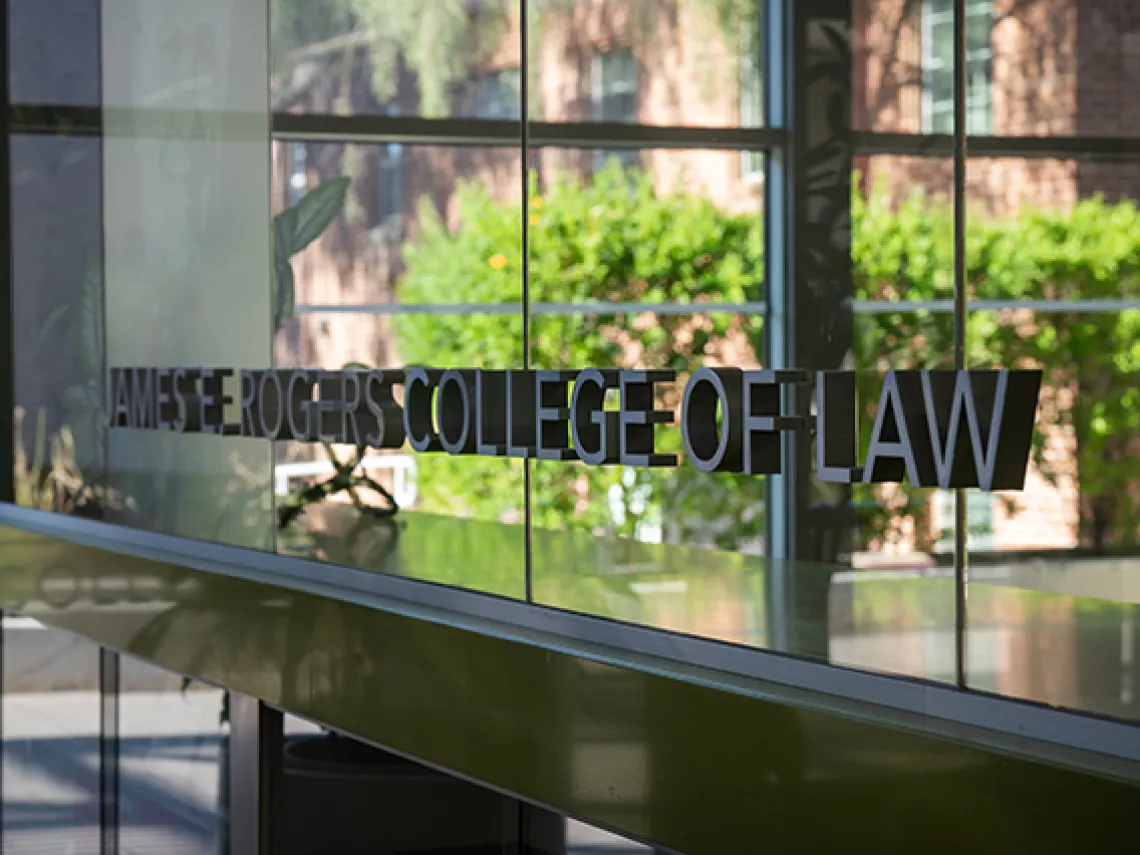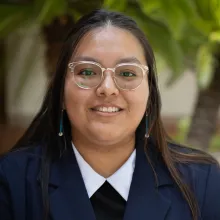Class of 2024: JD Grad Looks to Future Championing Indigenous Data Sovereignty

Name: Shania L. Kee (Navajo (Diné))
Degree: J.D.
Hometown: Piñon, AZ
Undergrad: Dartmouth College
What motivated you to pursue a degree in law, and how has that motivation evolved throughout your time in law school?

The simple answer is that I love learning. In 2020, I was taking law classes at Navajo Technical University because of my interest in the Navajo Legal System. My professors at the time planted the seed that I should go to law school. I never really thought about law school before that, but coming from a small community where there are many elders who do not understand the law or have any idea about the different legal systems—federal, state, and tribal—motivated me to pursue a degree in law. My motivation throughout law school broadened in a way to think of my role as a future lawyer to be that person who can communicate effectively with someone undergoing a legal issue that they might not understand or that they need to complete a legal task.
Why did you choose University of Arizona Law?
Being Diné and from Arizona, I chose Arizona Law due to the classes offered by the Indigenous Peoples Law & Policy program. The courses not only covered domestic tribal law, but there was also a focus on international law. I also wanted the opportunity to be taught by professors such as Rebecca Tsosie and Melissa Tatum.
Another reason I chose Arizona Law was because of the small class sizes. I wanted the smaller class size because I think that community is easier to build with smaller groups of people. To me, building community was super important and I wanted that chance to do so.
What area of law are you planning to specialize in, and what influenced this choice?
When I was a 1L, I learned about the concept of Indigenous Data Sovereignty (IDSov), which is the right of Indigenous Nation to govern their own data. Most people might think that IDSov is only relevant in the health sphere, but it implicates the legal sphere heavily in the United States, especially considering Federal Indian Law and Tribal Law. Due to my interest in IDSov, I am planning to specialize in Federal Indian Law or Tribal Law or Intellectual Property. I think that these specialties intersect in a way that is becoming increasingly important for tribes and those who with tribes to think carefully about when protecting and asserting legal rights over Indigenous/Traditional Knowledge.
Which courses or professors had the most significant impact on your legal education and why?
The professors from the Indigenous Peoples Law & Policy program that have had the most significant impact on my legal education are Professor Rebecca Tsosie, Professor Heather Whiteman Runs Him, Professor Melissa Tatum, and Professor Robert Hershey. I greatly benefited from their teaching, guidance, and scholarship. Each of these professors have offered me their advice on my own scholarship and taught me in some of my favorite classes such as Federal Indian Law, Tribal Courts and Tribal Law, and different seminars on legal issues that concern Indigenous Peoples. I believe that they exemplify that the faculty at Arizona Law are willing to help you explore what you want to study and provide opportunities in which you can do so.
What are your immediate plans post-graduation?
My immediate plan post-graduation is to study for the Arizona Bar Exam.
How do you hope to make a difference in the legal field or in society through your career? Future career plans?
I hope to make a difference in the legal field or in society by working with communities and listening to them to create positive change and protecting their rights. I can see myself doing that by being a litigator or a transactional lawyer or a law librarian or a law professor.
Looking back on your experience at the college, what would you have done differently or what advice would you give to your younger self?
It is so easy to let law school consume you in all aspects of your life, so try and create boundaries so that law school does not overwhelm you and that you can care of yourself emotionally, mentally, spiritually, and physically.
What will you miss most about University of Arizona Law and/or Tucson?
I will miss the Daniel F. Cracchiolo Law Library the most. I have spent numerous hours there studying, chatting with friends, and working with the law librarians. It has been one of the most memorable spaces for me during my time in Tucson and at Arizona Law, so I will miss it a lot.
What was your favorite school experience or extracurricular activity, and why?
I like being a part of the Arizona Law Ambassadors. While I was not an inaugural member of the program, I am lucky to have been part of the program this year. I think that the program that Ruben Fierros, the Director of Admissions, created has allowed me to share my experiences with potential and incoming students, which I feel like I would not have been able to do if I was not part of the program in a consistent way. I like that as part of the program, you also help with different events at the law school, which has given me opportunities to talk to different Alumni.
What are you most proud of while at Arizona Law?
I am most proud of my experience with the Arizona Journal of International and Comparative Law as a 2L writer and as a Senior Managing Editor. My work with AJICL has been demanding but rewarding. It has been especially rewarding to help our journal members through the publishing process and seeing our work pay off when we publish an issue. In addition, I am proud that my note was selected to be published in Volume 41 of AJICL, which will be out sometime soon.
Message for your fellow Class of 2024:
I am proud of what I have seen you all accomplish throughout our time at Arizona Law and wish you all the best in your careers.
